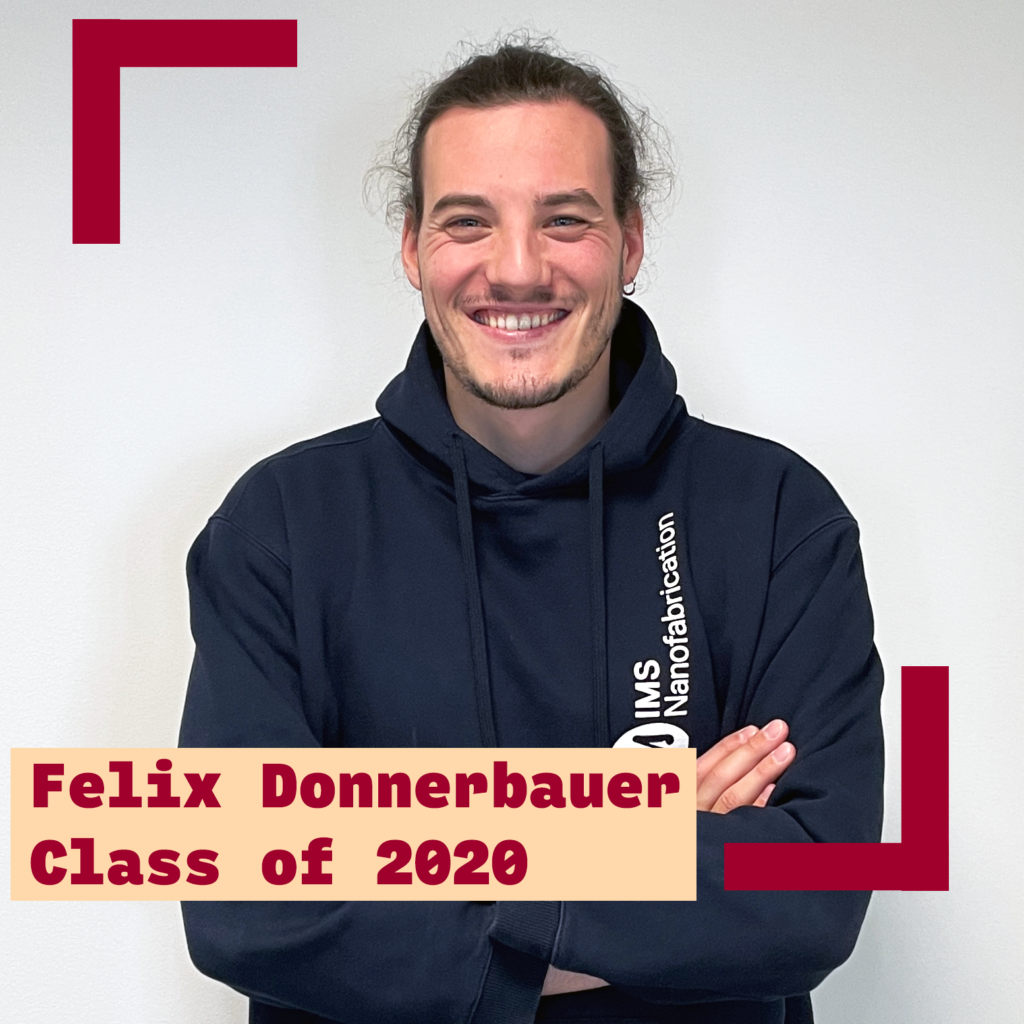This Former Student Puts Machines to Their Limit

Felix Donnerbauer works at IMS Nanofabrication as a software staging expert. He joined the company after finishing his Master’s degree on experimental optomechanics. Here he tells us about his jump from academia to industry.
IMS Nanofabrication is an Austrian high-tech company that specializes in the development and production of advanced electron-beam lithography tools. The company is a global leader in this field, and their tools are vital for creating photomasks used in advanced lithography processes. This has been Felix’s employer since he finished his master’s degree in 2020. Titled “Experimental requirements for particle optomechanics”, he completed it under the supervision of Markus Arndt. Felix had already joined Arndt’s group during his bachelor’s thesis. As part of his Master’s studies, he mainly focused on deepening his knowledge and know-how in the subfield of experimental optomechanics.
After finishing his degree, he discovered IMS thanks to his former bachelor thesis supervisor, who works at the company. When joining, his positio was as tuning engineer. He traveled the world calibrating electron-beam lithography machines for different customers, learning about their needs in production. After a year of globetrotting through the Taiwan, the USA, or South Korea, Felix started his current position as a Software Staging Expert.
Staging is the process of simulating the environment in which a software or tool will be deployed, to observe which bugs and problems might occur when using them in a production-like context. Felix explains it in detail, “Staging is the final hurdle a software needs to overcome to ensure that the entire package is working as intended. For IMS this means two things: One, simulating a customer production-like environment and observing if bugs or problems occur. Two, confirming that IMS internal procedures are unswayed and checking if they can be simplified by using new features. Feedback and issues found during the staging are relayed back to RnD. Once fixed and implemented, the tests repeated. This process usually takes several weeks and once the software passes all staging tasks, it is ready to deploy at the customer sites.” Via remote operation of the machine, Felix can test new features, perform standard customer procedures or check what happens when intertwining two different things. This is a thorough process, trying to find all the ways a customer might use a machine. As Felix puts it, “sometimes you have to do something dumb with the machine”, to have certainty about it working properly in different situations. But Felix’s work entails more, as he still travels to IMS on-site branches, maintains relations with customers and gives talks about the new software and other projects developed at the headquarters.
Three Tips from Felix (IMS Nanofabrication) for Physics Students
- Avoid tunnel vision: during your studies try to branch out, have a broader vision of physics and keep your curriculum diverse.
- Industry is not about cutting-edge academia: do not get intimidated by the complex world of theoretical physics at University, many of the jobs you will find outside academia will not care about that.
- Take a summer job in a company: experiencing the world outside of academia during your studies can help you get a better orientation about what awaits after graduation.
When considering what he learned at the Faculty and his current job, Felix highlights general problem-solving as the most important skill he has developed. Regarding his studies, background knowledge in physics and experience in experimental physics have come in handy for his work at IMS. This expertise is what allows him to better understand new challenges at work: “I couldn’t do this job just by graduating from high school”. Another skill Felix mentions is programming, which does not have to be very advanced, but a general idea of how code works is for sure beneficial.
One thing Felix missed during his studies was knowing that there were opportunities to do internships at companies. When he was at the Faculty, it was not clear that this was possible. Having spent some time in a company environment as an undergraduate, would have probably helped him. We hope, and that is why Physik Alumni exist, this improves for current students.
Felix truly seems to like his job. He explains how at IMS there are many fields represented, ranging from R&D –including electronics, mechanical, or material physics–to operations, an area in which he finds himself. About it, he highlights the opportunities to see the world and how the semiconductor industry keeps you at the edge of the seat. With that, there are always new challenges that demand flexibility and curiosity. “You always need to update your brain”– as Felix puts it.
To start in his sector, he believes graduates need two main things: technical expertise, which can totally vary depending on the nature of a company, and problem-solving skills, mainly data analysis and handling, as well as logical skills.
IMS Nanofabrication GmbH, founded in 1985 and headquartered in Brunn am Gebirge, Austria.
Specialization: multi-beam mask writers for the semiconductor industry. They develop electron-beam lithography systems essential for producing complex masks used in integrated circuit fabrication, particularly in advanced chip manufacturing.
Facilities in: Austria (Vienna and Brunn am Gebirge), the United States (Santa Clara, California; Hillsboro, Oregon; and Boise, Idaho), Taiwan (Tainan, Hsinchu, and Taichung), and South Korea (Hwaseong and Cheongju)
IMS Nanofabrication employs a multidisciplinary team, working across physics, electronics, and nanotechnology . More information at: https://www.ims.co.at/en/